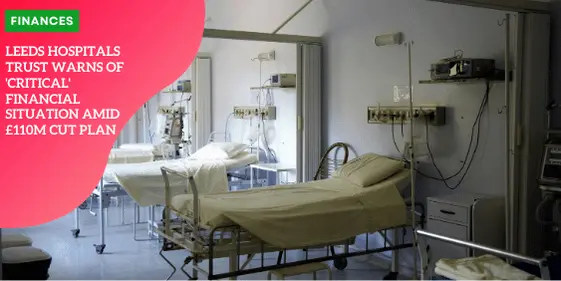Leeds Hospitals Trust Warns of ‘Critical’ Financial Situation Amid £110m Cut Plan

The Leeds Teaching Hospitals NHS Trust has issued a stark warning to its staff, indicating that its financial situation has reached a “critical” level.
The trust, which is one of the largest in the country, has been compelled to take “immediate action” to address a staggering financial shortfall amounting to £110 million.
This dire situation was outlined in an internal email to staff, which has since been obtained by BBC News, revealing the urgent need for cost-saving measures.
Internal Alarm Bells: Staff Email Reveals Severity of Financial Crisis
Details of the financial crisis were laid bare in a staff email sent by senior managers within the trust.
The email highlighted the gravity of the situation, stating that the trust’s finances were in “serious trouble” and that urgent interventions were necessary to prevent a further deterioration.
This revelation comes amid a wider financial challenge faced by eleven hospital trusts across Yorkshire, which collectively need to save £350 million from their combined budgets in the coming year.
Government’s Stance: Record Funding Amid Financial Struggles
Despite these pressing financial constraints, the government has emphasized its commitment to providing the NHS with record levels of funding.
However, the financial pressures continue to mount for the Leeds Teaching Hospitals NHS Trust (LTHT), where annual spending reaches £1.7 billion.
As one of the most significant NHS trusts in the country, the trust’s financial woes have now escalated to a point where drastic measures are being considered.
Impact on Critical Services: Staff Vacancies and Temporary Workforce Reductions
A particularly concerning element of the trust’s cost-saving plan involves holding staff vacancies open for 13 weeks, except for critical positions, and reducing the reliance on temporary staff.
This approach has raised considerable alarm among healthcare professionals.
Sarah Dodsworth, the regional director of the Royal College of Nursing, expressed deep concern over the potential dangers of this strategy.
She noted that temporary staff play a crucial role in covering staffing shortages, and their removal could reduce minimum staffing levels even further, jeopardizing the ability of nurses to provide safe and effective care.
Escalating Costs: Energy Prices Compound Financial Challenges
The trust’s financial predicament has been exacerbated by surging energy costs.
In a recent board meeting, it was revealed that energy expenses had rocketed by 174% compared to the previous year.
This significant increase in operating costs has added a substantial burden to the already strained financial resources.
Trust’s Response: Identifying Savings and Focusing on Patient Care
In response to the leaked email, Simon Worthington, the director of finance at LTHT, provided further insight into the trust’s approach to managing the financial shortfall.
He noted that the £110 million in necessary savings represented approximately 6% of the overall trust budget.
Worthington emphasized that “the majority” of these savings had already been identified and that the trust was actively seeking ways to reduce expenditure on bank and agency staff, given the substantial increase in the number of permanent clinical staff in recent years.
“We are focusing on how to achieve these savings in an efficient and sustainable manner while ensuring that high-quality patient care remains at the core of our efforts,” Worthington stated. He expressed gratitude for the hard work and innovative ideas of the staff, which have contributed to identifying several methods to bridge the financial gap.
Wider Implications: Other Yorkshire Trusts Facing Similar Challenges
The financial struggles of the Leeds Teaching Hospitals NHS Trust are not isolated.
An examination of documents from ten other NHS hospital trusts in West, North, and South Yorkshire revealed a collective necessity to save £350 million in the upcoming year.
For instance, the Bradford Teaching Hospitals NHS Foundation Trust has openly acknowledged facing “unpalatable options” as it endeavors to achieve savings of up to £39 million.
Likewise, the Calderdale and Huddersfield NHS Foundation Trust has indicated that its financial saving plan necessitates compliance with national mandates to reduce headcount.
Broader Context: Pressures from a Growing and Ageing Population
Hospital trusts across the region are grappling with the budgetary pressures brought on by a growing and ageing population, which presents increasingly complex healthcare needs.
Despite record-level funding from the government, as highlighted by the Department of Health and Social Care, healthcare spending in real terms faces constraints due to inflationary pressures.
Recent statistics from HM Treasury reveal that total government spending on the health service in Yorkshire and the Humber rose to £16.5 billion in 2023, an increase from £12 billion before the 2019 general election.
Nonetheless, the financial challenges remain acute across the board.
Insights from Experts: Political Dimensions of Healthcare Budgeting
Sally Gainsborough, a senior policy analyst at the Nuffield Trust, commented on the broader financial landscape in which these hospital trusts operate.
She observed that healthcare spending in England, in real terms, is experiencing slight cuts due to inflationary pressures.
Gainsborough further noted that hospital budgets are subject to political decisions, and in the current financial year, there appears to be a consensus among the main political parties that the NHS will not receive significant additional funding.
Conclusion: Navigating a Critical Financial Landscape
The Leeds Teaching Hospitals NHS Trust is navigating an undeniably critical financial landscape.
With immediate actions required to save £110 million, the trust is faced with the daunting task of implementing budgetary adjustments while striving to maintain the quality of patient care.
The involvement of local and national stakeholders, along with the collective efforts of staff, will be crucial in addressing this financial crisis.
As the trust works towards bridging the financial gap, the wider healthcare community in Yorkshire continues to grapple with similar challenges.
These developments underscore the broader context of financial pressures faced by the NHS, where the balance between fiscal responsibility and the imperative to provide safe, high-quality care remains a complex and pressing issue.






